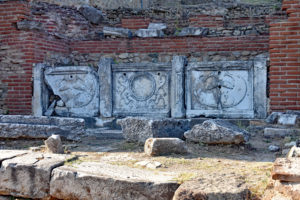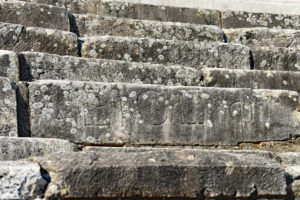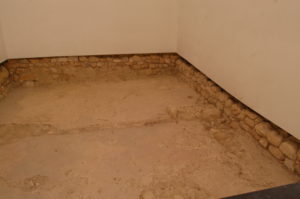Peneda-Geres is the only national park in Portugal, within 10 kilometres of the Spanish border. The part we visited had little in the way of trails, tourist centres or souvenirs (thank goodness). As a result it was perhaps less advantaged than other areas.
Most waterways in Iberia seem to have been dammed, created huge reservoirs and generating electricity. There were also wind turbines on the peaks, not features to be seen in the Yorkshire Dales or Lake District.
A dry spring and summer had reduced water levels to not much more than they had been before the dams. Nonetheless the trees and meadows were green. Farmers are encouraged to keep traditional (and now threatened) herds of cattle, sheep and goats. There were plenty in evidence along the roads, where it is strongly advised to proceed with caution. A common arrangement seems to be for the wife to lead the herd, usually of mixed animals, with a dog running about without apparent aim, and the husband to follow, sometimes on a tractor of considerable age.
In the villages grain is stored in stone-built vaults, about the size of a traditional caravan raised on a set of rocks to deter rats and allow an air flow. The houses are beginning to be modernised, or at least painted white in the way Wordsworth found inappropriate to the Lakes. The roads remain narrow but most offer no difficulty.
We stayed at a place called Bella Vista but, as someone remarked, all it had was the vista. It was no distance to drive back to the town where we’d asked for directions, Montalegre. This we found increasingly attractive, beginning with good coffee and at an extreme distance from Belem, delectable pasteis (custard tarts).
Montalegre has a castle, free to visit, a few reasonable shops and a number of good restaurants. We tried two: Dom Joao and the cheaper but no less enjoyable Tasca do Acougue, which is a simple bistro just below the castle. Here we thought an omelette each and a salad would serve but the waiter said No, too much. So we took his advice and found the omelette was huge, plenty for two, with ham. The salad had eggs and anchovies. A local wine cost 3 Euros and coffee 80 cents.
A walk around the castle cleared the head and allowed us to see the church below the mound. There is also an ecomuseum, where I’d asked directions before. A very helpful young guide showed us round the displays, some of which proved almost to be the same as we would see in the countryside.
There is a very strong tradition of superstition in the area: Friday 13th being a day of festivity to ward off evil whenever it occurs. There were to be two this autumn. An ever-present figure is the priest, who tries to reassure people that nothing bad will happen just because of the date. Childless women go to the so-called Devil’s Bridge and promise to name their hoped-for child as required. Our guide said she knew of no young people with the specified name but it did occur in older generations.
A very practical belief is in a thatched raincoat, which looks like a West African god: a conical headdress covering the face and then an all-round cloak like a half-open umbrella. Considering the efficacy of thatched roofs this seems entirely sensible. A further custom is the bull fight, not the matador variety but descended from the wild animals’ battle for supremacy and mating rights. Two bulls battle in the arena.
The museum has a good collection of artefacts as well as displays on the ecology of the region. With more time we would have paid further visits.
We drove once over the peaks: exhilarating but not to be repeated lightly. A good cup of coffee was a much needed reward. For our onward journey we chose the lower road, still with its share of climbs and descents not to mention bends but with wonderful views from a number of parking areas.
If we were to return it would be further north perhaps, where the walking is better signposted and we might explore the smugglers’ routes into Spain. These may no longer be necessary but they carry a good story. People used to load a donkey with contraband and send it without identification along the tracks it knew well. It would then come back with the value of goods sent or other items in exchange. If police should stop it they would have no clue to its owners and might even assume it had strayed so leave it to find its way home.










